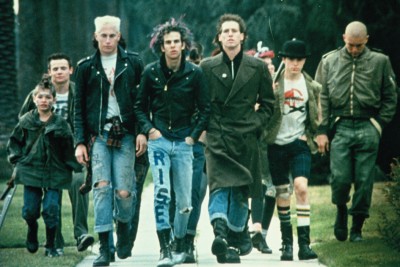With its roots planted firmly in the exploitation films of the 1970s, Penelope Spheeris' Suburbia is a gutsy, arresting movie that nevertheless can't escape the limitations of its small budget. Spheeris applied the exploitation formula to new subject matter, and a new setting, making Suburbia seem slightly more novel than it actually is. I would contend that Spheeris undercut her obvious passion for the plight of these characters by forcing them into a script filled with genre clichés.
After a wonderfully shocking opening sequence in which an infant is thrashed to death by a Doberman, we enter the world of the T.R. gang, a group of angry, dispossessed teenagers who - through one set of circumstances or another - have wound up homeless. They live in an abandoned neighborhood somewhere on the outskirts of Los Angeles, stealing food and branding each other with the initials of the gang (which stand for The Rejected). The T.R. kids find themselves hounded by psychotic middle-class home-owners and the police as they attempt to carve out a place for themselves in 1980s America.
First and foremost, these kids are pure punk. Characters like Jack Diddley and Joe Schmo sport ragged leather jackets adorned with their own embellishment and scrawled handwriting, outrageous hairstyles, and contempt for conventional wisdom in all its forms. The film's publicity materials make much of the fact that the movie contains "live" performances by D.I., The Vandals, and TSOL. The music is important, but what's more important is the "fuck you" attitude embodied by the characters in the movie, and their reasons for holding it. As an outgrowth of a decline in middle-class values - mainly the crumbling of the enormously attractive social façade first built in the 1950s and the fraudulent politics of the 1960s and 1970s - these characters represent a broad range of young people who came of age between 1975 and 1985. Self-mutilation, a lack of hygiene, music that expressed pure rage, and personal style that intended to offend were a few of their weapons. Writer-director Penelope Spheeris, who first covered the punk scene in her excellent documentary series, The Decline of Western Civilization, captures this attitude exceedingly well, and in that sense Suburbia is an interesting document of an era.
However, it doesn't have much else to recommend it. Spheeris chose to cast mostly non-actors, and that makes sense in theory, especially given her involvement in and knowledge of the LA punk scene. However, she may have taken this good idea too far; the actors don't appear to have been coached at all, delivering flat, perfunctory line readings. They often seem more like kids antsy to get the job done and go home than disaffected youth.
The film is inappropriately lit, sometimes looking more like an '80s sitcom than the gritty melodrama it means to be. And, while a film of this sort shouldn't look glossy and expensive, it should at least bear some level of editorial polish, but Suburbia is missing that element. It renders the storytelling choppy, arbitrary, and often inert.
Suburbia will be of interest to anyone with fond memories of the LA punk scene, early '80s movie culture, or exploitation flicks. It's too bad that it doesn't live up to its promise, however, as it could have easily been a much better film had more attention been paid to the performances and narrative filmcraft.


No comments:
Post a Comment